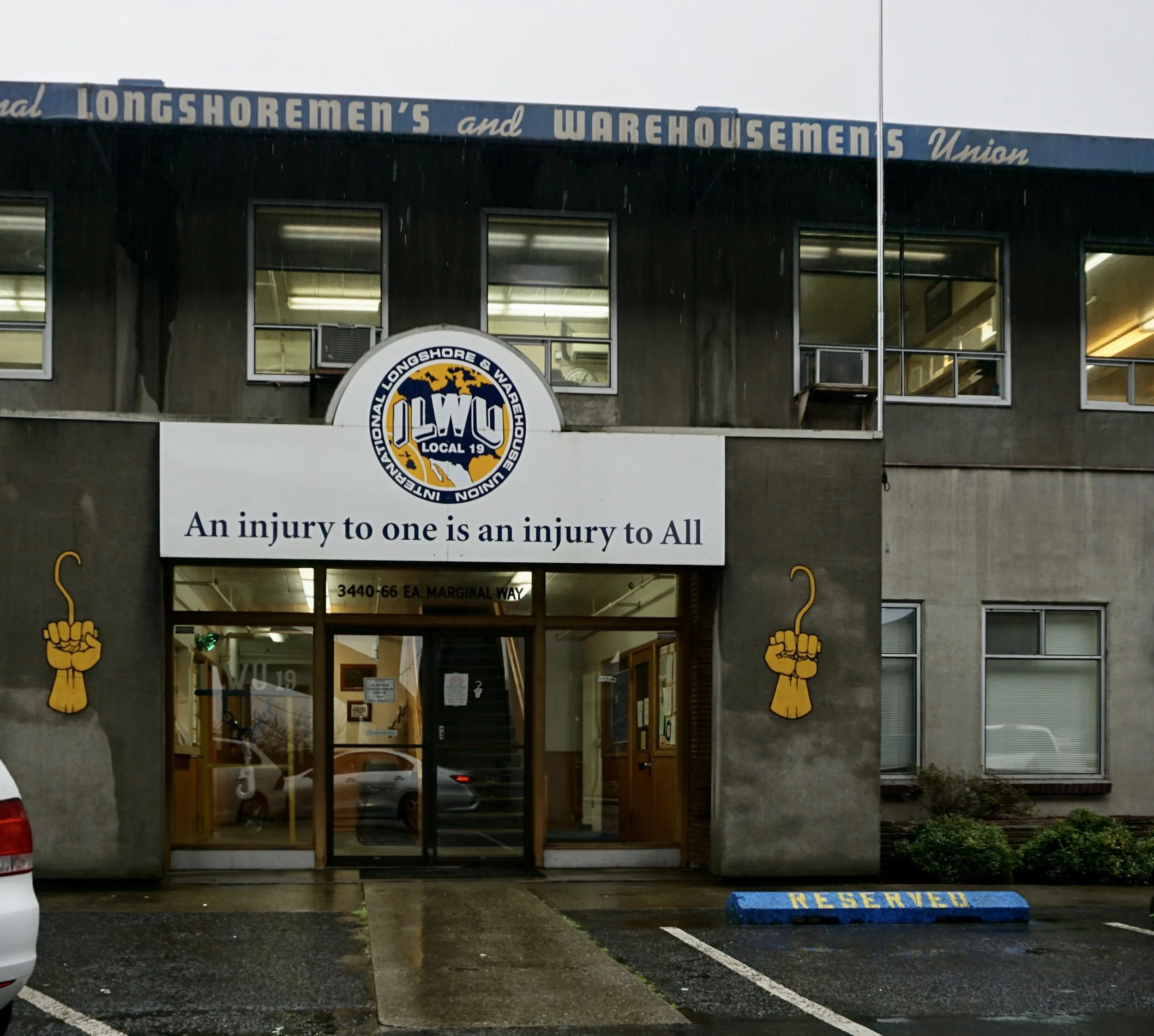Bees, Farmers, and Longshoremen?
What ever am I doing spending my afternoon at the ILWU ((International Longshoreman and Warehousemen’s Union) Local 19 in Seattle? Because as Madame President of the Northwest Farmers Union, I’m following the guidance of Helen Keller who said, “Alone we can do so little, together we can do so much.”
I’ve been embroiled in a few conversations in the past few weeks that have me muddling on community organizing. Namely – the need for organizing the farming community as one diverse entity. Veggie farmers, cow farmers, bee farmers, fish farmers; are our significant issues and responsibilities not more similar then different? Worker’s rights, climate change, parity, environmental degradation and regeneration?
Post WWII many farmers both moved away from diversity on the landscape, as well as communal diversity. When Washington farmer Nash Huber was young his family raised grains, berries, veggies, beef, honey, and pork. They also had a large garden and a milking cow that feed the family. This was not boutique, but standard in rural America. By the time he graduated high school in the 60’s, and moved away to college to study food science, his family’s Midwest farm had transitioned mostly into monoculture. Nash wasn’t the only one to leave the farm, nearly his whole generation drained from the countryside in search of a white picket fence and a pastel home. This post-war timeline also saw farmers begin to self-segregate into groups like the National Association of Wheat Growers, the American Beekeeping Federation, American Meat Science Association, the National Corn Growers Association, and Washington Apple Commission, etc. to represent them in DC and to the public. This movement was set in stone in the 1980s with the commodity check-off programs. Diverse all-farmer membership based co-op groups like the Oregon and Washington Farmers Unions dwindled, and eventually dissolved.
And where has this gotten us? According to a February 5th press release by the National Famers Union farm bankruptcies rose 20% last year to an 8 year high; Farm debt reached $416 billion, the highest since the 1980s farm crisis; and 1/3 of farm income came from government subsidies and crop insurance.
I believe that we not only need to build diversity back onto our landscapes, and farm economies, but into our community organizing. This is why I’m proud to serve on the National Famers Union Board of Directors as Northwest Farmers Union President.
One of my first tasks was to organize our annual meeting. We pulled together seven members of the National and Northwest Farmers Unions for a day of strategic planning and farm tours. A far cry from the first ever Washington Farmers Union’s 1908 inaugural convention boasting 7,000 attendees, but hey, sometimes progress is non-linear.
Not that I want the wheels to come flying off our little co-op,* but we could stand for a few more members. As we define our mission and work towards our values, we’ve decided to take a collaborative approach to organizing. As not to re-invent the wheel with creating just another northwest farmer policy, advocacy, and education group, we’ve been meeting with folks from across our states representing organizations like the Pierce County Ag Advisory Committee, Carbon Washington, Friends of Family Farmers, and the Fishing Vessel Owners Association, to find how we can collaborate for the greater good (and recruit more members).
About this time last year I met three brothers from the ILWU Local 19 at the NFU Annual Convention in Belleview, WA. They were interested in an agreement of solidarity with the NWFU, and I had no idea what that could mean. After months of mulling over where the intersection of food producers and longshoremen could exist, I decided to just head to the Union Hall and putter around for the afternoon.
I was pleasantly surprised of the progressive nature of the group, as well as appreciative of their views of this community organizing puzzle from a different perspective. As an example, they see a couple of issues in this year’s WA SB 5947, the Sustainable Farms and Fields Grants bill, that I think are valid and worth a conversation. Also, one of the largest commodities to move outward through their port is Montana and NW wheat, so issues in ag markets have the potential to affect their jobs.
Speaking of jobs, the VP of Local 19 handed me a newspaper printout from December of 1977 when this union did their job as farmer allies. Members of the American Agriculture Movement (who later co-produced the first FarmAid concert with Willie Nelson) had formed a protest line at the Port of Seattle to strike against below parity wheat prices, and the longshoremen honored it, and didn’t cross the line and go to work.
So perhaps a more fitting quote would be - “A rising tide lifts all boats,” popularized by JFK.
I’m excited to work off of the enthusiasm garnered in my recent trip to Washington and to continue to work away from injustice and towards supporting diversity in our landscapes, economies, and communities, while staying grassroots and humble. As wise Uncle Wendell states in this eloquent essay, In Distrust of Movements, written in 1999 for Orion magazine, “We can grow good wheat and make good bread only if we understand that we do not live by bread alone.” I aim to participate in “The Nameless Movement for Better Ways of Doing” non-movement by continuing to recognize that the solution to our problems is not a silver bullet, but brass shrapnel; that I have my own personal part to play by way of always doing better for my local economy and community; and to bring this message forth to others through unexpected collaborations.
To see what we’re up to, and become a member of the Northwest Farmers Union click here.
* Despite the “Union” title, NFU and NWFU are actually organized as grassroots farmer co-ops.




